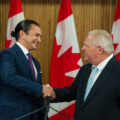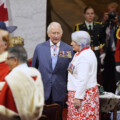Last week, The Hub was home to a wonky yet important debate about how to reform the federal government in order to improve its capacity for policy development and implementation.
The debate started when former Ontario government political aide, Andrew Evans, and I published an essay in favour of a new public administration model within the Prime Minister’s Office that would involve the establishment of a National Economic Council and Domestic Policy Council comprised of relevant cabinet ministers, public servants, political staff, and possibly non-elected appointees, and supported by a dedicated PMO staff, with the mandate to strengthen policy capacity and implementation oversight on behalf of the prime minister.
Although we recognize that such policy councils would likely contribute to a further centralization of the federal government, we argue that (1) the trend towards centralization has been unabated for decades and so there’s a good case that we ought to organize ourselves around it rather than simply lament it, and (2) in a world in which most major policy initiatives will necessarily involve multiple departments and agencies, then centralized oversight is really the only way to ensure successful implementation.

The second point is worth emphasizing: as former political advisers, we’ve both experienced the challenges of achieving policy progress in a governmental structure that’s inherently siloed with ministerial responsibility limited to one’s own portfolio. Multi-departmental policy agendas tend to end up orphaned and suboptimal in such an environment. This is an institutional failing.
PMO policy councils, which would involve direct representation from the departments involved in multi-departmental initiatives, represent in our minds the best way to institutionalize the whole-of-government focus necessary to successfully deliver on such initiatives. For those within the “Ottawa bubble”, one might think of them as something like institutionalized, permanent, and sophisticated “four corners meetings.”
We should also emphasize for those concerned that such councils couldn’t themselves become critics of the government. They wouldn’t be responsible for producing public-facing policy research or communicating publicly on behalf of the government. They would instead be internal councils designed to improve policy development and implementation within the government itself. In practical terms, they would strengthen the prime minister’s capacity to develop his or her own policy ideas, pressure test ones that come from within government departments or external sources, and coordinate the implementation of multi-departmental initiatives. For this reason, we referred to these policy councils as “do tanks” rather than “think tanks.”
The proposal received a thoughtful rebuttal on Wednesday from former clerks of the Privy Council, Kevin Lynch and Mel Cappe, and former assistant secretary to the cabinet, Jim Mitchell. If one is going to have critics, this is a pretty strong group.
Although they agree that public administration reform is needed, they push back against the proposal for policy councils housed within PMO. Their principal concern is that it would contribute to a further centralization of the federal government and in turn undermine the principles of cabinet government and ministerial responsibility. They would instead prefer a return to an era of strong cabinet ministers like C.D. Howe, Don Mazankowski, and Paul Martin.
One can accept that there’s an inherent trade-off here and that our proposal comes with such a risk. But my response to Cappe, Lynch, and Mitchell (whom it must be said I respect a great deal) would be multi-fold:
- Our proposal aims to see the world as it is in which there’s clearly a significant gap between the decentralization of policymaking capacity and the centralization of decision-making within the federal government. Their response, by contrast, proposes to return to a system that hasn’t practically existed for several decades. That they cite Jeffrey Simpson’s two-decades-old book, The Friendly Dictatorship, is a sign that the change that they champion is unlikely to come.
- They make a big deal about the fact that the policy council model derives from the U.S. presidential system and therefore is somehow incompatible with Canada’s Westminster model. But as they no doubt know, one of the strengths of the Westminster model is its inherent flexibility. For instance, there’s only statutory cabinet committee in the federal system is the Treasury Board. The prime minister otherwise has tremendous scope to organize his or her government as they see fit. One can envision PMO-based policy councils working in parallel with Canada’s system of cabinet governance such that the councils could help to inform cabinet decision-making and then support the implementation of its decisions.
- This is a big one: Cappe, Lynch, and Mitchell fail to grapple with the inherent challenge of successfully implementing horizontal policy initiatives in an inherently siloed system. One can point to various instances where it has directly contributed to governmental failures. For instance, during the pandemic, one part of the government entered into a vaccine agreement with a Chinese-state-based supplier at the same time that another part of the government believed that the Chinese state was involved in acts of bio-espionage at the Winnipeg Lab. The failure of these different parts of the government to communicate with one another was not only the source of great embarrassment but it delayed Canadians’ access to a vaccine. Ottawa needs a better mechanism to pull together different expertise, information, and policy tools into a more coherent form of governance. In the absence of centralized coordination, our experience is that the inherent structure of government represents a significant impediment to progress on multi-departmental initiatives.
- Yet, as mentioned above, there are few policy issues facing the country today that fit neatly within the Financial Administration Act or other statutes that govern the basic functioning of the federal government. Climate change, aging demographics, Indigenous reconciliation, national security reform, a pro-growth and productivity agenda, and even a policy response to a new Trump administration will require a whole-of-government agenda. Who is going to organize and coordinate such an agenda? An individual line department? The answer is “clearly, it is not.”
- Which prompts the question: who is it going to be? If I didn’t know any better, I’d wonder if implicit in their analysis, Cappe, Lynch, and Mitchell would simply prefer if it’s the Privy Council Office itself. For others, anyway, the principle (and unsaid) concern might be more about an expanded role for the political arm of the government relative to the public service than it is about restoring the principles of cabinet government and ministerial responsibility themselves. Yet it must be remembered that while the federal public service is comprised of some great people, it’s far from infallible. The status quo in which the political arm of the government has asymmetrical capacities and resources relative to the public service—particularly in the face of the massive expansion of the federal employment footprint—has produced an overdependency problem including a lack of checks and balances. PMO-based policy councils with dedicated policy staff would create a healthy tension with the system that, based on our experiences, would produce better policy outcomes.
The upshot: although we’re honoured to have critics like Cappe, Lynch, and Mitchell, we’re ultimately unpersuaded by their rebuttal. We commonly agree that reform is needed. But we disagree about what form it ought to take. We’d argue that our practical proposal better reflects the current federal system and the challenges that it faces than their proposal to return to a distant past no longer up to meeting today’s challenges.
Recommended for You

‘His agenda excludes large swaths of the economy’: Sean Speer on defining Mark Carney’s economic vision for Canada

Rudyard Griffiths and Sean Speer: Carney has his ambitions. But he must face the economic realities

Trevor Tombe: We’re on the verge of a new era for internal trade in Canada—if only the provinces can cooperate

Need to Know: The irony of King Charles’ land acknowledgement




